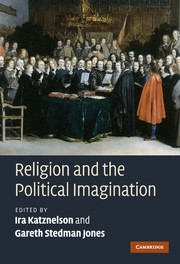Book contents
- Frontmatter
- Contents
- List of contributors
- Acknowledgements
- Introduction: multiple secularities
- 1 Secularisation: religion and the roots of innovation in the political sphere
- 2 Regarding toleration and liberalism: considerations from the Anglo-Jewish experience
- 3 The Enlightenment, the late eighteenth-century revolutions and their aftermath: the ‘secularising’ implications of Protestantism?
- 4 In the lands of the Ottomans: religion and politics
- 5 The Russian Orthodox Church and secularisation
- 6 The American experience of secularisation
- 7 French Catholic political thought from the deconfessionalisation of the state to the recognition of religious freedom
- 8 Religion and the origins of socialism
- 9 From 1848 to Christian Democracy
- 10 The disciplining of the religious conscience in nineteenth-century British politics
- 11 Colonial secularism and Islamism in North India: a relationship of creativity
- 12 The 1960s
- 13 Gendering secularisation: locating women in the transformation of British Christianity in the 1960s
- 14 Does constitutionalisation lead to secularisation?
- 15 Europe's uneasy marriage of secularism and Christianity since 1945 and the challenge of contemporary religious pluralism
- 16 On thick and thin religion: some critical reflections on secularisation theory
- Index
1 - Secularisation: religion and the roots of innovation in the political sphere
Published online by Cambridge University Press: 05 June 2012
- Frontmatter
- Contents
- List of contributors
- Acknowledgements
- Introduction: multiple secularities
- 1 Secularisation: religion and the roots of innovation in the political sphere
- 2 Regarding toleration and liberalism: considerations from the Anglo-Jewish experience
- 3 The Enlightenment, the late eighteenth-century revolutions and their aftermath: the ‘secularising’ implications of Protestantism?
- 4 In the lands of the Ottomans: religion and politics
- 5 The Russian Orthodox Church and secularisation
- 6 The American experience of secularisation
- 7 French Catholic political thought from the deconfessionalisation of the state to the recognition of religious freedom
- 8 Religion and the origins of socialism
- 9 From 1848 to Christian Democracy
- 10 The disciplining of the religious conscience in nineteenth-century British politics
- 11 Colonial secularism and Islamism in North India: a relationship of creativity
- 12 The 1960s
- 13 Gendering secularisation: locating women in the transformation of British Christianity in the 1960s
- 14 Does constitutionalisation lead to secularisation?
- 15 Europe's uneasy marriage of secularism and Christianity since 1945 and the challenge of contemporary religious pluralism
- 16 On thick and thin religion: some critical reflections on secularisation theory
- Index
Summary
Many of the great social theorists – Hume, Marx, Durkheim, Weber and Freud among them – predicted the loss of religious belief as society developed in wealth and complexity and humans grew more rational and scientific. Perhaps one day they will be vindicated, but so far, their projections are strikingly inadequate, as people continue to seek religious experience, espouse religious beliefs, and embrace religious community. Nevertheless, important changes did happen to religion and the predictions of the grand theories have served as the basis for the secularisation thesis – the conjecture that modernity brings with it a decline in belief at the individual level and religious power at the institutional one. The continuing power of religion as well as the clear change in its role justifies continued interest in this field.
A large literature on secularisation developed mainly in the fields of sociology and history. This scholarship is now also enriched with Charles Taylor's major study of the rise of the secular age, a grand, detailed and integrated story, in which he traces changes in the nature and sensibility of spiritual believing through intellectual history and philosophy. Yet, even in light of the wealth of detail from these fields of study, specific aspects of the secularisation story need further understanding.
In this chapter, I examine changes in the political realm once the dominance of religious authority began to come apart.
- Type
- Chapter
- Information
- Religion and the Political Imagination , pp. 23 - 45Publisher: Cambridge University PressPrint publication year: 2010
- 17
- Cited by



